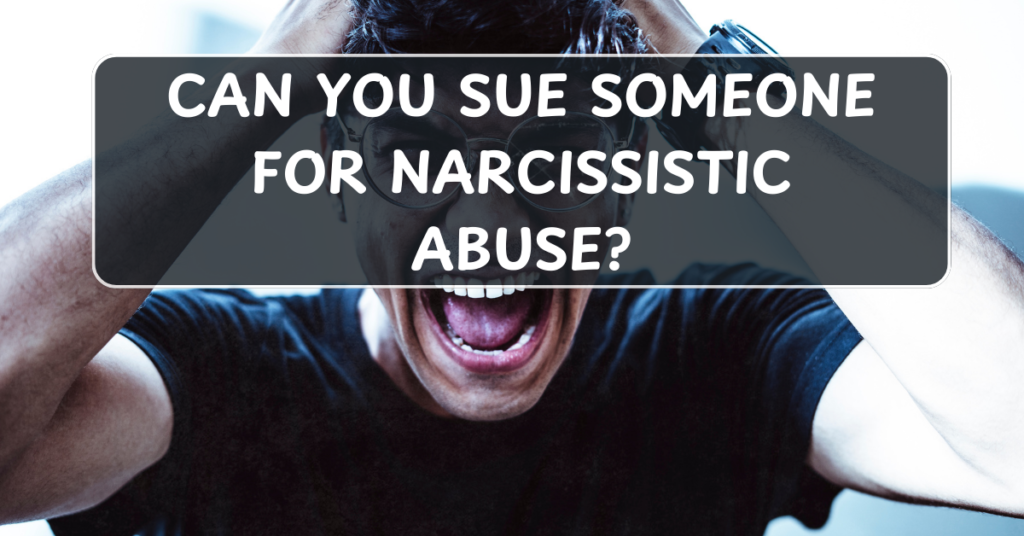
Narcissistic abuse is a form of emotional and psychological manipulation inflicted by someone with narcissistic tendencies. This abuse can have severe consequences for the victim, including trauma, anxiety, depression, and financial loss. Given the harm it causes, many victims wonder whether they can sue the abuser and seek compensation.
The short answer is: Yes, you may be able to sue someone for narcissistic abuse, but it depends on the specific circumstances and the evidence you can present. Legal claims related to narcissistic abuse often fall under civil laws, such as personal injury, emotional distress, defamation, or breach of contract. Here’s what you need to know:
What Is Narcissistic Abuse?
Narcissistic abuse involves manipulative behaviors used to control or exploit others. It may include:
- Gaslighting: Making the victim doubt their own reality.
- Verbal Abuse: Insults, criticism, and humiliation.
- Isolation: Cutting off the victim from friends and family.
- Financial Exploitation: Manipulating finances to maintain control.
- Emotional Manipulation: Using guilt, shame, or threats to dominate.
Legal Grounds for Suing for Narcissistic Abuse
To sue someone for narcissistic abuse, your case must align with one or more of the following legal claims:
- Intentional Infliction of Emotional Distress (IIED):
- This legal claim applies if the abuser’s conduct was extreme, outrageous, and intentionally caused severe emotional distress.
- You will need to provide evidence of the abuse and its impact on your mental health, often through therapy records or expert testimony.
- Defamation (Slander or Libel):
- If the narcissist spread false and damaging statements about you, either verbally (slander) or in writing (libel), you may have grounds for a defamation lawsuit.
- Proof of the false statements and their harm to your reputation is essential.
- Financial Exploitation or Fraud:
- If the narcissist manipulated or coerced you into financial decisions that caused you harm, such as signing contracts or giving them money, you may sue for financial fraud or exploitation.
- Documentation of financial transactions or communications can strengthen your case.
- Assault or Battery:
- If the abuse involved physical harm, you could file a civil lawsuit for assault or battery in addition to pursuing criminal charges.
- Medical records, photos of injuries, or eyewitness testimony can serve as evidence.
- Breach of Contract:
- If the narcissist violated a written or verbal agreement, such as in a business or personal partnership, you may sue for breach of contract.
Challenges of Suing for Narcissistic Abuse
- Proving Emotional Abuse: Emotional and psychological harm can be difficult to prove in court without substantial evidence, such as texts, emails, or expert testimony from therapists.
- Legal Fees: Civil lawsuits can be costly, and some victims may struggle to afford legal representation.
- Counterclaims: A narcissistic abuser may counter-sue or use legal tactics to prolong the case, which can be emotionally draining.
- Statute of Limitations: Depending on the jurisdiction and the nature of the claim, there may be time limits for filing a lawsuit.
Steps to Take if You’re Considering Legal Action
- Document Everything:
- Keep a detailed record of abusive incidents, including dates, descriptions, and evidence such as messages or financial documents.
- Seek Legal Advice:
- Consult an attorney who specializes in personal injury, family law, or civil litigation to evaluate your case and guide you through the legal process.
- Focus on Mental Health:
- Work with a therapist to process the trauma and gather expert testimony if needed.
- Explore Alternative Resolutions:
- In some cases, mediation or arbitration may be a faster and less stressful way to resolve disputes and seek compensation.
Conclusion
Suing someone for narcissistic abuse is possible, but it requires a well-documented case and a clear legal claim. While legal action may not undo the harm caused, it can provide a sense of justice and financial compensation to help rebuild your life. If you’re considering taking this step, consult a qualified attorney and prioritize your mental health as you navigate the process.
If you’re in immediate danger or need support, reach out to a trusted friend, therapist, or domestic abuse hotline for assistance.
